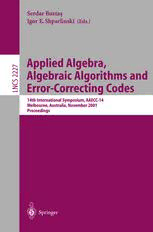Table Of ContentLecture Notes in Computer Science 2227
EditedbyG.Goos,J.Hartmanis,andJ.vanLeeuwen
3
Berlin
Heidelberg
NewYork
Barcelona
HongKong
London
Milan
Paris
Tokyo
Serdar Boztas¸ Igor E. Shparlinski (Eds.)
Applied Algebra,
AlgebraicAlgorithms and
Error-Correcting Codes
14th International Symposium, AAECC-14
Melbourne, Australia, November 26-30, 2001
Proceedings
1 3
SeriesEditors
GerhardGoos,KarlsruheUniversity,Germany
JurisHartmanis,CornellUniversity,NY,USA
JanvanLeeuwen,UtrechtUniversity,TheNetherlands
VolumeEditors
SerdarBoztas¸
RMITUniversity,DepartmentofMathematics
GPOBox2476V,Melbourne3001,Australia
E-mail:[email protected]
IgorE.Shparlinski
MacquarieUniversity,DepartmentofComputing
NSW2109,Australia
E-mail:[email protected]
Cataloging-in-PublicationDataappliedfor
DieDeutscheBibliothek-CIP-Einheitsaufnahme
Appliedalgebra,algebraicalgorithmsanderrorcorrectingcodes:14th
internationalsymposium;proceedings/AAECC14,Melbourne,Australia,
November26-30,2001.SerdarBoztas¸;IgorE.Shparlinski(ed.).-Berlin;
Heidelberg;NewYork;Barcelona;HongKong;London;Milan;Paris;Tokyo:
Springer,2002
(Lecturenotesincomputerscience;Vol.2227)
ISBN3-540-42911-5
CRSubjectClassification(1998):E.4,I.1,E.3,G.2,F.2
ISSN0302-9743
ISBN3-540-42911-5Springer-VerlagBerlinHeidelbergNewYork
Thisworkissubjecttocopyright.Allrightsarereserved,whetherthewholeorpartofthematerialis
concerned,specificallytherightsoftranslation,reprinting,re-useofillustrations,recitation,broadcasting,
reproductiononmicrofilmsorinanyotherway,andstorageindatabanks.Duplicationofthispublication
orpartsthereofispermittedonlyundertheprovisionsoftheGermanCopyrightLawofSeptember9,1965,
initscurrentversion,andpermissionforusemustalwaysbeobtainedfromSpringer-Verlag.Violationsare
liableforprosecutionundertheGermanCopyrightLaw.
Springer-VerlagBerlinHeidelbergNewYork
amemberofBertelsmannSpringerScience+BusinessMediaGmbH
http://www.springer.de
©Springer-VerlagBerlinHeidelberg2001
PrintedinGermany
Typesetting:Camera-readybyauthor,dataconversionbySteingräberSatztechnikGmbH,Heidelberg
Printedonacid-freepaper SPIN:10840981 06/3142 543210
Preface
TheAAECCSymposiaSerieswasstartedin1983byAlainPoli(Toulouse),who,
togetherwithR.Desq,D.Lazard,andP.Camion,organizedthefirstconference.
Originally the acronym AAECC meant “Applied Algebra and Error-Correcting
Codes”. Over the years its meaning has shifted to “Applied Algebra, Algebraic
Algorithms, and Error-Correcting Codes”, reflecting the growing importance of
complexity in both decoding algorithms and computational algebra.
AAECCaimstoencouragecross-fertilizationbetweenalgebraicmethodsand
their applications in computing and communications. The algebraic orientation
is towards finite fields, complexity, polynomials, and graphs. The applications
orientationistowardsboththeoreticalandpracticalerror-correctioncoding,and,
since AAECC 13 (Hawaii, 1999), towards cryptography. AAECC was the first
symposium with papers connecting Gro¨bner bases with E-C codes. The balance
between theoretical and practical is intended to shift regularly; at AAECC-14
the focus was on the theoretical side.
The main subjects covered were:
– Codes:iterativedecoding,decodingmethods,blockcodes,codeconstruction.
– Codes and algebra: algebraic curves, Gr¨obner bases, and AG codes.
– Algebra: rings and fields, polynomials.
– Codes and combinatorics: graphs and matrices, designs, arithmetic.
– Cryptography.
– Computational algebra: algebraic algorithms.
– Sequences for communications.
Six invited speakers covered the areas outlined:
– Robert Calderbank, “Combinatorics, Quantum Computers, and Cellular
Phones”
– James Massey, “The Ubiquity of Reed-Muller Codes”
– Graham Norton, “Gro¨bner Bases over a Principal Ideal Ring”
– Vera Pless, “Self-dual Codes – Theme and Variations”
– Amin Shokrollahi, “Design of Differential Space-Time Codes Using Group
Theory”
– Madhu Sudan, “Ideal Error-Correcting Codes: Unifying Algebraic and
Number-Theoretic Algorithms”.
Except for AAECC-1 (Discrete Mathematics 56, 1985) and AAECC-7 (Dis-
crete Applied Mathematics 33, 1991), the proceedings of all the symposia have
been published in Springer-Verlag’s Lecture Notes in Computer Science (Vols.
228, 229, 307, 356, 357, 508, 539, 673, 948, 1255, 1719).
It is a policy of AAECC to maintain a high scientific standard, comparable
to that of a journal. This has been made possible thanks to the many refer-
ees involved. Each submitted paper was evaluated by at least two international
researchers.
VI Preface
AAECC-14receivedandrefereed61submissions.Ofthese,1waswithdrawn,
36 were selected for publication in these proceedings, while 7 additional works
contributed to the symposium as oral presentations. Unrefereed talks were pre-
sented in a “Recent Results” session.
The symposium was organized by Serdar Bozta¸s, Tom Høholdt, Kathy Ho-
radam, Igor E. Shparlinski, and Branka Vucetic, with the help of Asha Baliga,
Pride Conference Management (Juliann Smith), and the Department of Math-
ematics, RMIT University. It was sponsored by the Australian Mathematical
Society.
We express our thanks to the staff of Springer-Verlag, especially Alfred Hof-
mann and Anna Kramer, for their help in the preparation of these proceedings.
August 2001 Serdar Bozta¸s and Igor E. Shparlinski
Organization
Steering Committee
General Chair: Kathy Horadam (RMIT Univ., AUS)
Conference Co-chair: Tom Høholdt (Technical Univ. of Denmark, DK)
Program Chair: Igor Shparlinski (Macquarie Univ., AUS)
Program Co-chair: Branka Vucetic (Sydney Univ., AUS)
Publication: Serdar Bozta¸s (RMIT Univ., AUS)
Conference Committee
J. Calmet T. Høholdt S. Lin
M. Clausen K. Horadam O. Moreno
G. Cohen H. Imai H. Niederreiter
P.G. Farrell H. Janwa A. Poli
G.L. Feng J.M. Jensen T.R.N. Rao
M. Giusti R. Kohno S. Sakata
J. Heintz H.W. Lenstra Jr. P. Sol´e
Program Committee
I.F. Blake M. Giusti S. Litsyn
J. Calmet J. Gutierrez A. Nechaev
C. Carlet J. Heintz H. Niederreiter
P. Charpin T. Helleseth D. Panario
M. Clausen H. Imai S. Sakata
P.G. Farrell E. Kaltofen P. Sol´e
M. Fossorier T. Kasami H. van Tilborg
M. Giesbrecht L. Knudsen C. Xing
Local Organizing Committee
Asha Baliga Serdar Bozta¸s Kathy Horadam
Referees
D. Augot N. Boston C. Carlet
A. Baliga F. Boulier P. Charpin
I.F. Blake S. Bozta¸s M. Clausen
A. Bonnecaze J. Calmet G. Cohen
VIII Organization
R. Cramer C. Hao S. Murphy
I. Damg˚ard T. Hashimoto V.K. Murty
M. Dichtl J. Heintz A. Nechaev
C. Ding T. Helleseth H. Niederreiter
I. Duursma K. Horadam D. Panario
P.G. Farrell X-D. Hou L. Pecquet
G-L. Feng H. Imai V. Rijmen
H.C. Ferreira J. Jensen S. Sakata
M. Fossorier G. Kabatiansky P. Sarkar
T. Fujiwara E. Kaltofen H.G. Schaathun
P. Gaborit T. Kasami I. Shparlinski
J. Galati F. Keqin B. Shung
S. Galbraith T. Kløve A. Silverberg
S. Gao L. Knudsen P. Sol´e
V.P. Gerdt L. Kulesz B. Stevens
M. Giesbrecht T. Laihonen H. van Tilborg
M. Giusti S. Ling B. Vucetic
F. Griffin S. Litsyn J.L. Walker
J. Gutierrez F. Morain K. Yang
Y.S. Han R. Morelos-Zaragoza C. Xing
Sponsoring Institutions
Australian Mathematical Society
Table of Contents
Invited Contributions
The Ubiquity of Reed-Muller Codes .................................. 1
J.L. Massey (ETH-Zu¨rich and Lund Univ.)
Self-dual Codes-Theme and Variations................................ 13
V. Pless (Univ. of Illinois)
Design of Differential Space-Time Codes Using Group Theory ........... 22
A. Shokrollahi (Digital Fountain)
Ideal Error-Correcting Codes:
Unifying Algebraic and Number-Theoretic Algorithms .................. 36
M. Sudan (MIT)
Block Codes
Self-dual Codes Using Image Restoration Techniques ................... 46
A. Baliga (RMIT Univ.) and J. Chua (Monash Univ.)
Low Complexity Tail-Biting Trellises of Self-dual Codes of Length 24, 32
and 40 over GF(2) and Z of Large Minimum Distance ................. 57
4
E.Cadic(FranceTelecomR&D),J.C.Carlach(FranceTelecomR&D),
G. Olocco (Univ. Paris-Sud), A. Otmani (Univ. Limoges),
and J.P. Tillich (Univ. Paris-Sud)
F -Linear Cyclic Codes over F : DFT Characterization ............... 67
q qm
B.K. Dey and B.S. Rajan (Indian Inst. of Science)
Code Constructions
Cyclic Projective Reed-Muller Codes ................................. 77
T.P. Berger and L. de Maximy (Univ. Limoges)
Codes Identifying Sets of Vertices .................................... 82
T. Laihonen and S. Ranto (Univ. Turku)
Duality and Greedy Weights of Linear Codes and Projective Multisets.... 92
H.G. Schaathun (Univ. Bergen)

